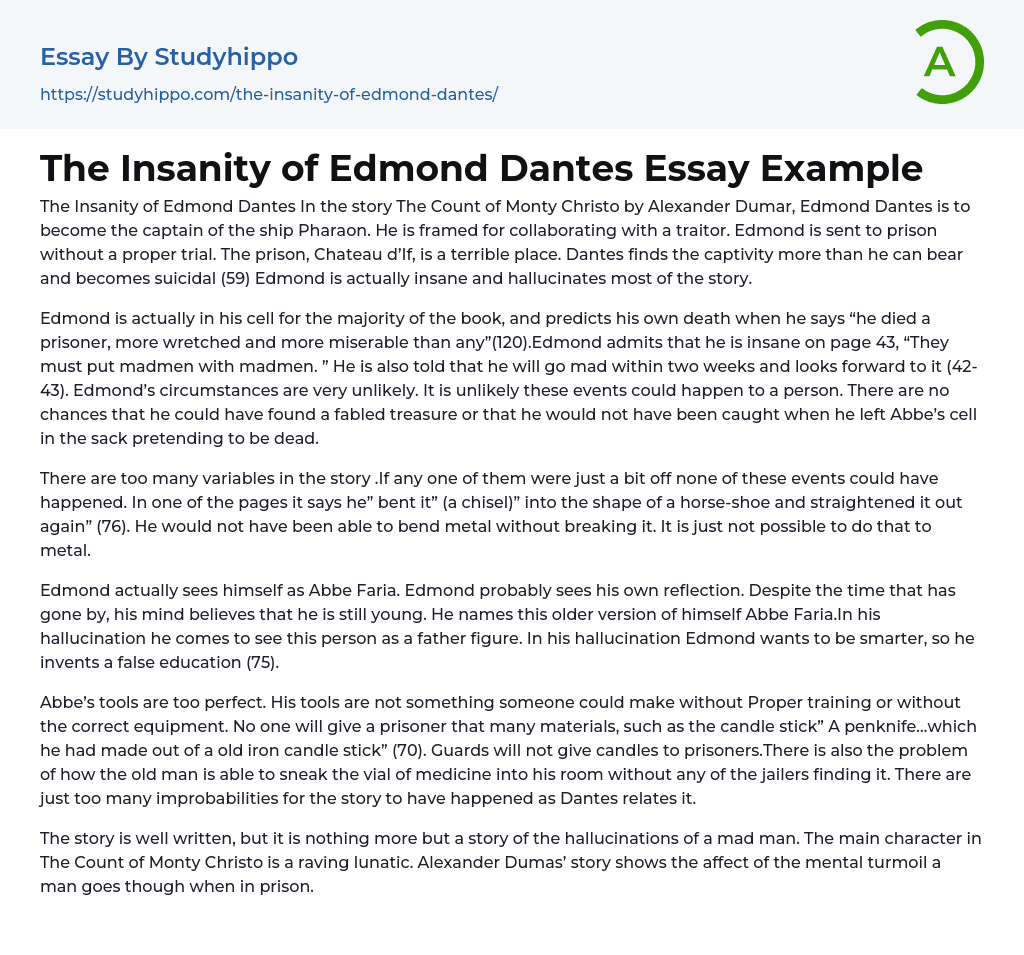Edmond Dantes, the protagonist of Alexander Dumas' "The Count of Monte Cristo," was set to become the captain of Pharaon until he was falsely accused of collaborating with a traitor and sent to Chateau d'If without a fair trial. The grim conditions at the prison drove Dantes to the brink of suicide (59), and he eventually became delusional, rendering most of the story a product of his madness.
Throughout the majority of the book, Edmond remains imprisoned and predicts his own miserable demise, declaring "he died a prisoner, more wretched and more miserable than any" (120). Notably, on page 43, Edmond confesses his madness, stating "They must put madmen with madmen," and eagerly awaits his mental breakdown within the next two weeks (42-43). Considering the sheer unlikelihood of Edmond's circumstances, it seems almost impossible that he stumbled up
...on a legendary treasure or managed to escape undetected after pretending to be dead in the Abbe's cell.
Due to numerous factors, the events described in the story may not have occurred if there had been any slight variation. One page recounts how the protagonist "bent" a chisel into a horse-shoe shape and then straightened it out again (76). However, it is impossible to bend metal without causing it to break.
Despite the passing of time, Edmond imagines himself as Abbe Faria and sees his own youthful reflection. He regards Abbe Faria as a father figure and desires to be more intelligent, leading him to fabricate an untrue education for himself (75).
The precision of Abbe's tools is remarkable and indicative of formal training and proper equipment. It is highly unlikely that someone without expertise could produce such instruments. Moreover,
obtaining materials, such as candlesticks, would be challenging for a prisoner to attain. Guards would not willingly supply these items—even if a prisoner did manage to acquire them, there is no obvious way to hide them. Additionally, the fact that the old man was able to conceal a vial of medicine in his cell without being discovered by the jailers is questionable. The implausibilities surrounding these events cast doubt on the accuracy of Dantes' account.
Although well-written, The Count of Monte Cristo is simply a tale of a madman's hallucinations. The lead character is portrayed as a lunatic who suffers from mental turmoil while incarcerated, as demonstrated in Alexander Dumas' story.
- Commitment essays
- Insanity essays
- Animal Cruelty essays
- Charles Manson essays
- Crime Prevention essays
- Crime scene essays
- Criminal Justice essays
- Criminology essays
- Cyber Crime essays
- Damages essays
- Detention essays
- Distracted Driving essays
- Drug Trafficking essays
- Drunk Driving essays
- Forensic Science essays
- Gang essays
- Hate Crime essays
- Homicide essays
- Identity Theft essays
- Juvenile Crime essays
- Juvenile Delinquency essays
- Juvenile Justice System essays
- Law Enforcement essays
- Murder essays
- Organized Crime essays
- Penology essays
- Piracy essays
- Prison essays
- Property Crime essays
- Prostitution essays
- Punishment essays
- Punishments essays
- Rape essays
- Robbery essays
- Serial Killer essays
- Sexual Assault essays
- Sexual Assault on College Campuses essays
- Sexual Harassment essays
- Sexual Offence essays
- Stealing essays
- Surveillance essays
- Ted Bundy essays
- Victim essays
- Violent crime essays
- White Collar Crime essays




